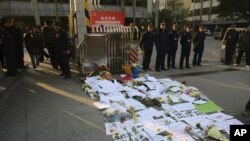Government officials and journalists at a newspaper in southern China are reported to have reached a tentative deal to end a week-long standoff over government media censorship.
Though many details of the agreement remain unclear, reports said editors who had gone on strike have agreed to return to work and will publish the next edition of the Southern Weekly as usual on Thursday.
Quoting sources close to the negotiations, some reports said staff who walked off the job would not face punishment and the government would agree to loosen press controls that many journalists saw as excessive.
Doug Young, a journalism professor at Fudan University in Shanghai, says that the apparent concessions were likely the best possible outcome for the journalists.
"I would call it maybe a small victory, because it doesn't sound like they won any concrete concessions," says Young. "Getting this sort of a broader more vague promise probably represents the best they could have hoped for in this particular instance."
The dispute began last week when censors blocked an editorial urging political reform, and replaced it with one praising the Communist Party. It soon turned into a nationwide online protest against China's strict media censorship, with celebrities and other public figures expressing their support for the paper.
On Wednesday, a small group of protesters gathered for a third straight day outside the Southern Weekly in Guangzhou to protest censorship. One of the protesters, Xiao Qingshan, said he wants wider reforms to the country's media.
"We want freedom of speech to air our real voice," he says. "If we always have censorship and the media face shutdown every day, the media become a tool to cheat the people. Is there any hope for our country?"
On Tuesday, minor scuffles broke out between free-speech protesters and Communist Party supporters, who carried red flags and posters of Chairman Mao.
The protesters called for the resignation of Tuo Zhen, the provincial propaganda chief, who they blamed for changing the editorial and overseeing other strict censorship measures. Many observers said Beijing was unlikely to make such a huge concession.
Any possible concessions made by the government under the tentative agreement remain unclear, partly because Southern Weekly staff have reportedly been told not to discuss the case with foreign media. When contacted by VOA, staff at the paper's Beijing and Guangzhou offices said they were not in a position to discuss the situation.
The controversy has also reportedly widened to include another paper with a progressive reputation. Several unconfirmed reports suggest Dai Zegeng, the editor of the Beijing News, resigned after being forced to publish a state media editorial blaming the controversy on "external activists." Although the Beijing News did publish the editorial, it was placed near the back of the paper.
There were other signs suggesting Beijing had no intention of handing the rebel journalists any broad concessions. A leaked Central Propaganda Department directive circulating online suggests that "hostile foreign forces" were responsible for the dispute, and insisted that government control of the media is an "unwavering basic principle."
Though many details of the agreement remain unclear, reports said editors who had gone on strike have agreed to return to work and will publish the next edition of the Southern Weekly as usual on Thursday.
Quoting sources close to the negotiations, some reports said staff who walked off the job would not face punishment and the government would agree to loosen press controls that many journalists saw as excessive.
Doug Young, a journalism professor at Fudan University in Shanghai, says that the apparent concessions were likely the best possible outcome for the journalists.
"I would call it maybe a small victory, because it doesn't sound like they won any concrete concessions," says Young. "Getting this sort of a broader more vague promise probably represents the best they could have hoped for in this particular instance."
The dispute began last week when censors blocked an editorial urging political reform, and replaced it with one praising the Communist Party. It soon turned into a nationwide online protest against China's strict media censorship, with celebrities and other public figures expressing their support for the paper.
On Wednesday, a small group of protesters gathered for a third straight day outside the Southern Weekly in Guangzhou to protest censorship. One of the protesters, Xiao Qingshan, said he wants wider reforms to the country's media.
"We want freedom of speech to air our real voice," he says. "If we always have censorship and the media face shutdown every day, the media become a tool to cheat the people. Is there any hope for our country?"
On Tuesday, minor scuffles broke out between free-speech protesters and Communist Party supporters, who carried red flags and posters of Chairman Mao.
The protesters called for the resignation of Tuo Zhen, the provincial propaganda chief, who they blamed for changing the editorial and overseeing other strict censorship measures. Many observers said Beijing was unlikely to make such a huge concession.
Any possible concessions made by the government under the tentative agreement remain unclear, partly because Southern Weekly staff have reportedly been told not to discuss the case with foreign media. When contacted by VOA, staff at the paper's Beijing and Guangzhou offices said they were not in a position to discuss the situation.
The controversy has also reportedly widened to include another paper with a progressive reputation. Several unconfirmed reports suggest Dai Zegeng, the editor of the Beijing News, resigned after being forced to publish a state media editorial blaming the controversy on "external activists." Although the Beijing News did publish the editorial, it was placed near the back of the paper.
There were other signs suggesting Beijing had no intention of handing the rebel journalists any broad concessions. A leaked Central Propaganda Department directive circulating online suggests that "hostile foreign forces" were responsible for the dispute, and insisted that government control of the media is an "unwavering basic principle."






